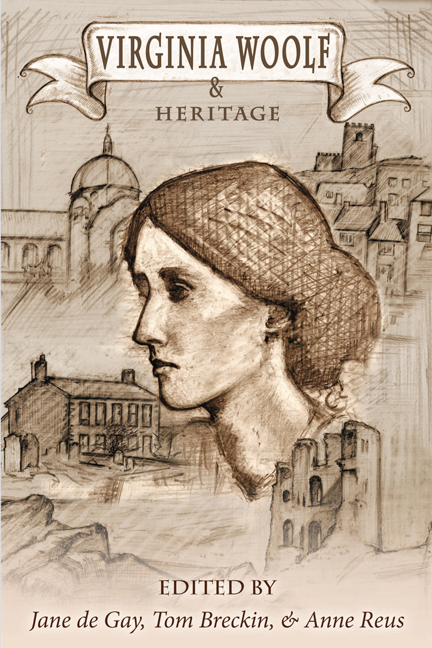Book contents
- Frontmatter
- Contents
- Introduction
- List of Abbreviations
- HERITAGE: A DEBATE
- HERITAGE, EDUCATION, AND MENTORING
- HERITAGE SPACES
- LITERARY AND CULTURAL HERITAGES
- Virginia Woolf in Greece: “Curious contrasts!”: Hellenism and Englishness
- Whose Idea of Tragedy? Mrs Dalloway and the Ancient Greek Tradition
- Silence, Darkness, and Dirt: Mysticism and Materiality in The Years and Between the Acts
- Virginia Woolf Reads the Romantics
- A Critical Heritage: Virginia Woolf, Leslie Stephen, and Walter Scott
- “Where Childhood's dreams are twined”: Virginia Woolf and the Literary Heritage of Lewis Carroll
- QUEER PASTS
- MODERNISM AND HERITAGE
- WRITING LIVES AND HISTORIES
- WOOLF'S LEGACIES
- FINALE
- Notes on Contributors
Virginia Woolf in Greece: “Curious contrasts!”: Hellenism and Englishness
from LITERARY AND CULTURAL HERITAGES
- Frontmatter
- Contents
- Introduction
- List of Abbreviations
- HERITAGE: A DEBATE
- HERITAGE, EDUCATION, AND MENTORING
- HERITAGE SPACES
- LITERARY AND CULTURAL HERITAGES
- Virginia Woolf in Greece: “Curious contrasts!”: Hellenism and Englishness
- Whose Idea of Tragedy? Mrs Dalloway and the Ancient Greek Tradition
- Silence, Darkness, and Dirt: Mysticism and Materiality in The Years and Between the Acts
- Virginia Woolf Reads the Romantics
- A Critical Heritage: Virginia Woolf, Leslie Stephen, and Walter Scott
- “Where Childhood's dreams are twined”: Virginia Woolf and the Literary Heritage of Lewis Carroll
- QUEER PASTS
- MODERNISM AND HERITAGE
- WRITING LIVES AND HISTORIES
- WOOLF'S LEGACIES
- FINALE
- Notes on Contributors
Summary
Engaging with the rich critical conversation that has emerged on the centrality of Greek literature and language to Virginia Woolf 's intellectual, aesthetic and feminist development, this paper explores how British Hellenism shaped Woolf 's sense of herself as a particularly English writer—and potential inheritor of the Greeks’ legacy—in part, through the “new” modernist discourses of archaeology and geology. Englishness is entwined with a pervasive imperialism; these new sciences, together with changes in cartographic representations of the planet, formed part of imperialism's discursive apparatus, contributing to British Hellenism as well as to early modernism. Between her two excursions to Greece in 1906 and 1932, Woolf crafts a unique aesthetic grounded in a multi-faceted sense of loss—personal, intellectual, and cultural—that will increasingly define her highly gendered sense of Englishness as anti-imperial, anti-war, and anti-institutional. This aesthetic, which I've elsewhere described as a “positive nihilism,” reveals Woolf 's complex response to the waning ideology of Victorian Hellenism and fashioning of a modern Englishness that attempts to mitigate its imperialist legacy in order to reclaim a more originary idea of the human, which she locates in the ancient Greeks.
Virginia Stephen studied Greek privately for nearly a decade prior to her inaugural journey to Greece in September 1906; she was also mourning the recent deaths of her parents and half-sister. More personal tragedy ensued on the trip: Thoby contracted typhoid, from which he died in late November. Language forms part of her grieving and recovery process; allusions to Greek appear in her earliest fiction, further refined by a nascent poetics of loss that will find fuller articulation in the early novels. Articulating as primary themes the losses provoked by imperialism and war, I read them, with many others, as intimately bound up with Woolf 's emerging Greek-inspired aesthetic of Englishness.
These experiences take place in the context of a waning British Hellenism that saturated late Victorian elite as well as popular culture. Theodore Koulouris uses the term “Greekness” to define Woolf's “private, post-Victorian Hellenic aesthetic.…[It] will appear as a distillation of her own understanding of canonical Greek texts filtered through an intricate network of gendered socio-cultural and political structures, into…a ‘poetics of loss’” (8). It includes a loss of social power, as Rowena Fowler posits.
- Type
- Chapter
- Information
- Virginia Woolf and Heritage , pp. 90 - 95Publisher: Liverpool University PressPrint publication year: 2017



